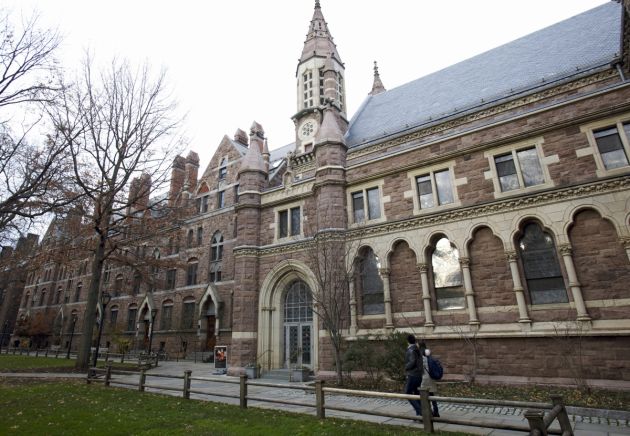US divinity school discusses Christianity's shifting future

During a robust public discussion at the Yale Divinity School, scholars and theologians discussed why there are fewer self-proclaimed Christians in modern American society and where the religion's future is shifting.
When opening the panel, Gregory E. Sterling, Dean of Yale Divinity School during the week that he considered the meeting as a down payment on a promise last year that he would examine the future of Christianity during his tenure.
"In my lifetime, 50 percent of people who grew up in mainline Protestant positions have left," Sterling said Thursday. "I might mention, for example, the Episcopal Church is closing 50 parishes a year. That is one example."
To discuss what has caused this transition and what it means for the religion in the United States, the dean hosted Ross Douthat, a columnist for The New York Times, and author Diana Butler Bass.
The two were moderated in separate discussions by Bob Abernethy, host of PBS's "Religion and Ethics Newsweekly," and Lillian Daniel, author of "When 'Spiritual but Not Religious' Is Not Enough."
During the discussion, both participants tended to agree that Christianity's role in American life had shrunk in the late 20th century.
Douthat, author of "Bad Religion: How We Became a Nation of Heretics," attributed much of the shift on two cultural revolutions during the 1960s and 1970s.
"If you look at religion at the mid-20th century, you see a crisis…to adapt to the landscape that the Cultural Revolution ushered in," Douthat said.
"If you look at the '60s and '70s, you see two big cultures that undercut the period."
The columnist attributed this shift primarily to the sexual revolution and the massive growth of wealth and the American middle class.
"Christian sexual ethics were out of step with the way Americans live their lives," he said.
According to Douthat, the Bible's lessons on financial moderation and pre-marital chastity have become incongruent with existing in the wealthiest nation in history.
Bass, author of "Christianity After Religion: The End of Church and the Birth of a New Spiritual Awakening," viewed the change as more of the institutions' failure to adapt or evolve in American life, despite there still being a wide opening for spiritual life.
"In the middle part of the 20th century, the institutions of religious life we had in the United States [were extraordinarily successful,]" Bass said.
"As life began to change around those institutions, they began to live off of what I would call the capital of an earlier age of religious life."
Bass contends that the disconnect came from the leaders of these religious institutions not noticing the drift of followers and writing off cultural shifts as a "fad" for much of the last four decades.
Both believe religion can again play a major role in the American landscape, but only if there are changes in the delivery system.
Douthat admits that due to his columnist work he is required to view the country in a very politically binary world, and says he often distinguishes a difference between liberal Christianity and conservative Christianity.
For Douthat, conservative Christianity saw a rise briefly under the leadership of U.S. President George W. Bush where in a post-9/11 "uncomplicated moment," there was a unity between Christianity, patriotism and a conservative resolve.
This allowed Catholics, evangelicals and other Christians to coalesce around a political leadership that would eventually implode during Bush's second term.
For Christianity to be more broadly embraced, Douthat seemed to suggest that liberal Christianity needs to reconcile their contemporary desires with a spiritual text that they frequently bend too much.
"I look at the reformulation that the liberal Christianity has attempted, I do not think it is theologically sound in historic Christian belief," Douthat said.
"I understand why it is done and I am not sitting here with an answer to how it should have handled the Sexual Revolution." Douthat does suggest though that the Sexual Revolution, which liberal Christianity has embraced, created higher divorce rates, more single parents and a litany of societal woes.
Bass countered that while there is a tendency in liberal Christianity to write off sex as a part of God's plan that this is due to churches' complete ineptitude at handling sexuality in a modern context.
Religious leaders' inability to confront 21st century standards may dictate the need to separate that issue from religion in the future.
However, while there is an increasing "20 percent" who choose not to be affiliated with any religion in the country, Bass argues that an interest in theology is still very prevalent.
"There's ton of great theology coming out of Latin American communities, black communities, huge numbers of women writing from parishes to parishes," Bass said. "[There are] young people…who want to engage in real theologic discussions, but there is not a lot of natural avenues to move through for younger generations."
Overall, Douthat tends to suggest that liberal Christianity has lost the "plot or thread" of their scriptures and have helped make it irrelevant in American life.
Bass, however, thinks that there is an untapped interest in Christianity that could be exploited if the mainstream channels shifted from the traditionally institutionalized methods.